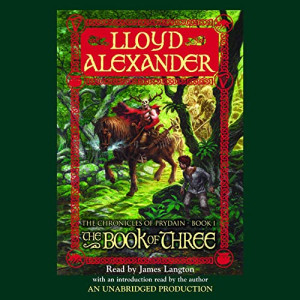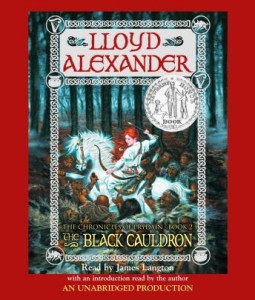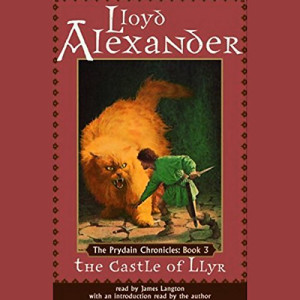 Lloyd Alexander brought magic to my childhood, never more so than with the five books collectively called the Chronicles of Prydain. I adored these books, and read them time on time. They were for me what the Harry Potter series is to my nieces. Later I read his other books including Time Cat and The Arkadians, and as an adult I have even reviewed two of his other titles, Westmark and The Rope Trick for Green Man Review.
Lloyd Alexander brought magic to my childhood, never more so than with the five books collectively called the Chronicles of Prydain. I adored these books, and read them time on time. They were for me what the Harry Potter series is to my nieces. Later I read his other books including Time Cat and The Arkadians, and as an adult I have even reviewed two of his other titles, Westmark and The Rope Trick for Green Man Review.
Which brings me back to the wee wild women. I struggled mightily to get them interested in these books, partly because I so enjoyed discussing HP with them, but seemingly to no avail. Then, Providence smiled on me and our kindly book editor sent me three audiobooks from the series. Oh Joy! I (ahem) diligently reread each title in preparation for my review, and marveled at the beautiful prose that conveyed so much in writing that primary school students could understand. And then I made a mistake. Yes, I loaned the tapes to my sister for use on car rides. Well, it’s been some months now, but I have finally pried them out their grubby little hands, and once again listed to the tapes while driving in my own car. Yes, gentle reader, it worked. The girls aren’t as enthused about Taran and Eilonwy, Gurgi and Dalban as I was, but I am proud to say the Lloyd Alexander has entered the bedtime reading list, and I hope to entice them further with some of his new titles.
Why the bother, you may ask? Well, if you haven’t read these books, whose characters and stories are very loosely drawn from the medieval Welsh tales collectively referred to as the Mabinogion, let me explain. The genius of this series is that Alexander manages to take some classical mythical themes and democratize them with some of the most engaging characters ever to grace the pages of children’s literature, both in this series and in his other work, which has drawn upon everything from Greek to Chinese to Indian sources. In Alexander’s works, the girls are spunky and intelligent, and the boys are plucky and, if sometimes a little bewildered, tend to win out through persistence that leads to a dawning self awareness. Yes, Virginia, the Hero really does have a thousand faces, often revealed by the Muse. In addition to toppling corrupt hierarchies with common sense, Alexander’s characters struggle with con men, with the lure of charismatic politicians, and characters whose egos prevent themselves and other from living in peace and contentment. These classic themes have never been more relevant. I highly recommend his work to young and old alike, and these audio books in particular for those seeking to share this series with the young people in their lives.
These three books form the beginning of the series, and find one Taran, a  young orphan being raised by an old enchanter, Dalban, and the farmer Coll, who shelter Hen Wen, the oracular pig. Taran, discontented with his incredibly dull life, longs for adventure, and to become a hero in the company of men, like Prince Gwydion, hero of the Sons of Don, who rule Prydain in a sort of benign way, loosely guiding the many kings of tiny kingdoms called cantrevs. In The Book of Three Taran does learn something of the world of heroes when Hen Wen disappears into the forest, fleeing the frightful Horned King, an evil war leader with a fatal secret. Along the way he does get to meet Prince Gwydion (who is decidedly less ambiguous and much more heroic than his counterpart in The Mabinogion), as well as an assortment of other characters, like the Princess Eilonwy of the red gold hair, Good Old Doli, an irritable dwarf of the Fair folk, and the creature Gurgi, as well as sort of misplaced soul named Flewdur Fflam, a king who wanders the country side as a traveling bard in the summer. Although it is not Taran who saves the day, he gains much before returning to Caer Dalben with his new Companions.
young orphan being raised by an old enchanter, Dalban, and the farmer Coll, who shelter Hen Wen, the oracular pig. Taran, discontented with his incredibly dull life, longs for adventure, and to become a hero in the company of men, like Prince Gwydion, hero of the Sons of Don, who rule Prydain in a sort of benign way, loosely guiding the many kings of tiny kingdoms called cantrevs. In The Book of Three Taran does learn something of the world of heroes when Hen Wen disappears into the forest, fleeing the frightful Horned King, an evil war leader with a fatal secret. Along the way he does get to meet Prince Gwydion (who is decidedly less ambiguous and much more heroic than his counterpart in The Mabinogion), as well as an assortment of other characters, like the Princess Eilonwy of the red gold hair, Good Old Doli, an irritable dwarf of the Fair folk, and the creature Gurgi, as well as sort of misplaced soul named Flewdur Fflam, a king who wanders the country side as a traveling bard in the summer. Although it is not Taran who saves the day, he gains much before returning to Caer Dalben with his new Companions.
The Black Cauldron (please don’t judge this work by the dreadful Disney adaptation!) finds the Companions reunited, along with Prince Gwydion, on a quest to destroy the pot in which the evil underworld lord, Arawn, cooks dead men overnight to create his mute, deathless warriors, the cauldron-born. Although not as well developed as in the Westmark trilogy, in this book Alexander deftly shows us the risks of following charismatic leaders, and the trouble that follows a person like the destitute Prince Ellidyr use false arrogance to mask doubts and fears about himself. True leadership is embodied by Prince Gwydion and the bard Adoan, whose charisma flow from their knowledge of self, and their ability to see the worth and beauty in the people and world around them. We also meet the incomparable Orddu, Orwen and Orgoch, in one of the best  treatments of the Triple Goddess, also known as the Three Fates, or Norns, that I have ever read.
treatments of the Triple Goddess, also known as the Three Fates, or Norns, that I have ever read.
In The Castle of Llyr Eilonwy leaves her scullery at Caer Dalban to become educated as a real Princess on the Isle of Mona, near her ancestral home. Although he is heartbroken and knows he could never win the princess, Taran accompanies her to the Isle of Mona, where he learns that the king and queen believe she is destined to marry their son, the hapless Prince Rhun. But soon after her arrival, Eilonwy is kidnapped, and Taran, reunited with Flewdur, with Prince Rhun in putative command, forms a rescue party. Now it is Eilonwy’s turn to choose between her powerful heritage as an enchantress in command of a rare book of real magic, and her love for the Companions. Where does true magic lie, and how does she choose? Well, the ending might not be all one would expect, but in a sense it is more than the reader might hope for.
But what about the audiobooks themselves, you ask? Well, these are wonderful, mostly due to astonishing ranges of voices and accents provided by James Langton. But first a disclaimer: as a North American, I haven’t a clue as to the connotations of the wonderful accents used for the different characters. I can only appreciate them for the way they sound to my ears, and the way they seem to fit the characters. Generally, I loved these ways these characters were brought to life, even in several cases where I was surprised at how they sounded. Good Old Doli in particular is a gem, and I suspect he sounds like some sort of coal miner or something, with his constant pronouncements on the inefficiencies that plague the realm of the Fair Folk. I expected Gurgi to have a sort of whining, high voice, but I came to love the low, gravelly voice, as Gurgi buffered Taran from his own inexperience with some of the best double entendres in the book, usually beginning with phrases like, “Poor, humble Gurgi . . .” or disclaimers about his “poor, tender head.” Dalben, Gwydion and Coll are great, and sound as I expected. Gwystal, Doli’s dour, pastey-faced colleague, is another gem. In fact, my only complaint is about Eilonwy, one of the few female characters in the book, with some of the best lines. (Lest I frighten prospective readers, there are many more female characters in Alexander’s later books, although he often pairs a young man and woman in a coming of age journey.) I just felt Eilonwy shouldn’t sound so ditzy, when she’s obviously the protaganist with the brains. But given the strength of the other characters, I can’t complain too much.
I heartily recommend these audiobooks as an antidote to discontent on long car rides, and as a lure for Alexander’s writing. Like the printed books, these offer both insight and delight, drawing on classic mythology, coloured with the best of American sensibilities. These heroes struggle with themselves as much as with any external foes, and when they triumph, there is a place for them in a world where people are tolerant and sensible. If this doesn’t seem to match the American ideals portrayed on the news, it at least represents the ones I hoped for as a young person, and seek to embody as an adult. Lloyd Alexander did me a good turn when he wrote these books, and I hope he will continue to inspire generations of folks — young and old alike.
(Random House Audio, 1962, 2004)
(Random House Audio, 1964, 2004)
(Random House Audio, 1966, 2004)
